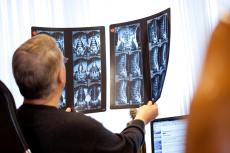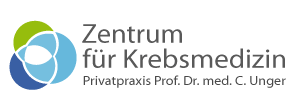Important Questions and Answers about Metastasised Breast Cancer
1. What caused my disease? Could I have prevented it?
Cancer occurs if the body cells genetically change and, in so doing, they no longer function like normal cells. Most are due to multiple defects in the genetic code; one can designate such defects as mutations. When such mutations occur, they are the result of not only genetic and hormonal influences, but also due to other external factors as well. Therefore, we don't speak of the cause for breast cancer, but rather of the risk factors. These include, for example, a history of breast cancer in the family, advanced age, no child-bearing, malnutrition or high radiation exposure. But because several of these factors must coincide, it is highly improbable that you will contract breast cancer due to just one of these factors affecting you.
2. How can breast cancer spread throughout my body?
"Breast cancer" means that the cells in the glandular tissue of the breast have changed in such a manner that they divide uncontrollably and multiple themselves. On the basis of such a malignant growth (tumour), the cancer cells can also penetrate into the surrounding tissues and succeed in accessing the blood vessels and lymph system. The cancer cells can then use the blood or lymph circulatory systems to transport themselves to other body regions, whereby they form new tumours, the so-called metastases.
3. Do I need to fear that my daughter will also suffer from breast cancer later on? What can she do that may possibly contribute to avoiding cancer?
Women whose mothers suffered from cancer have a higher risk of developing cancer, especially metastasised breast cancer. In addition to other genetic factors, mutations in specific "breast cancer genes" (BRCA-1 and BRCA-2) may be responsible. If it is proven that such mutations exist in these genes, then the risk of contracting breast cancer during the course of life increases up to 80%. There is a 50% probability that such genetic mutations are inherited by the daughter from the mother. If it is known that breast cancer runs in the family, we recommend a genetic consultation or a genetic test to determine possible changes in the breast cancer genes.
4. What actually are tumour markers?
Tumour markers generally are sugars-proteins that are produced from the cancerous growth and are released into the blood. If tumour markers are found, then this principally indicates a likelihood of cancer. Tumour markers are generally not suited for a reliable diagnosis. The most important tumour marker for metastasised breast cancer is CA15-3; others are CEA and, to some degree, also CA125. A decrease of tumour markers indicates a successful therapy, an increase indicates tumour growth.
5. Are there alternatives to the therapy proposed to me?
There are numerous therapeutic substances that can be used in the fight against metastasised breast cancer. Your doctor strives to employ the medication that presents the highest probability of success in your case. Each one of the medications has its own side effects profile. If no clinical response is observed, the treatment will be switched to another substance.
In the metastasised stage of breast cancer, hormonal therapy is the treatment of choice. In comparison to chemotherapy, it has fewer side effects. Chemotherapy is the 2nd choice treatment and, if at all possible, should be implemented with just one substance (monotherapy) instead of with multiple substances (polychemotherapy). Radiation therapy is highly rated for treatment of bone metastases, brain metastases and thoracic wall metastases since chemotherapy is inferior to radiation therapy for such cases.
6. What happens if there is no response to the therapy?
If there is no positive response to the therapy, then it is needed to switch to another therapy concept. In the case of metastasised breast cancer, there are numerous substances available to be used as alternatives.
7. Are there new active agents that are available in the USA, but that are not yet available in Germany?
Due to international networks, there is no established effective therapy that is only conducted in the USA and that is not available in Germany. Within the context of scientific studies, there may be substances that are only tested in the USA and not in Germany, however, these therapies are of an experimental nature and the substances are not yet available for patients outside the study.
8. What side effects should I expect during hormonal therapy?
The principle of hormonal therapy consists of inhibition of the possible tumour-stimulating effect of the body's endogenously produced female hormones (oestrogens and progesterone). Since these medications essentially eliminate the effect of the body's own hormones, the side effects are similar to those experienced by many women during menopause: outbreaks of sweating, bodyweight increase, mood swings, and changes in the vocal chords. In rare cases, thromboses and/or embolisms may occur.
9. What does a therapy with HER-2 antibody Herceptin really entail?
HER-2 antibody Trastuzumab (Herceptin) blocks in a targeted fashion a specific binding site, i.e. a receptor on the cancer cells, and thereby prevents uncontrollable growth of these cells. Laboratory examination can determine the quantity of HER-2 receptor sites on the cancer cells. This is a prerequisite for a successful therapy with Herceptin. However, only about 25% of women can be treated with Herceptin due to the strong expression of HER-2 receptors.
10. How can I help mobilise my body's own natural defences and enhance my immune system?
Good nutrition is particularly important in this case. A varied diet consisting of a high percentage of fresh fruits and vegetables, high fibre and, above all, a low quantity of animal fats is recommendable. One to two fish meals per week, consumption of alcohol only in small quantities, and absolutely no smoking.
Physical activity is often neglected: Regular, light physical endurance training involving e.g. swimming, running or walking is recommended. Sufficient sleep during the night and, if possible, a nap or breaks during the day. Likewise, relaxation techniques, such as autogenic training, progressive muscle relaxation as per Jacobsen, yoga, Tai-chi or Qi-Gong, can also be very useful. All these methods to find peace and quiet, help our immune system via the so-called psychoneuroimmunological interactions by which our immune system is demonstrably influenced by the nervous system.
Individualised Expertise

Prof. Dr. med. Clemens Unger has been active for 30 years in both research as well as patient care and is numbered among the nationally and internationally distinguished experts in the diagnosis and successful treatment of cancer.
We look forward to your contact request!
 Centre for Cancer Medicine
Centre for Cancer Medicine